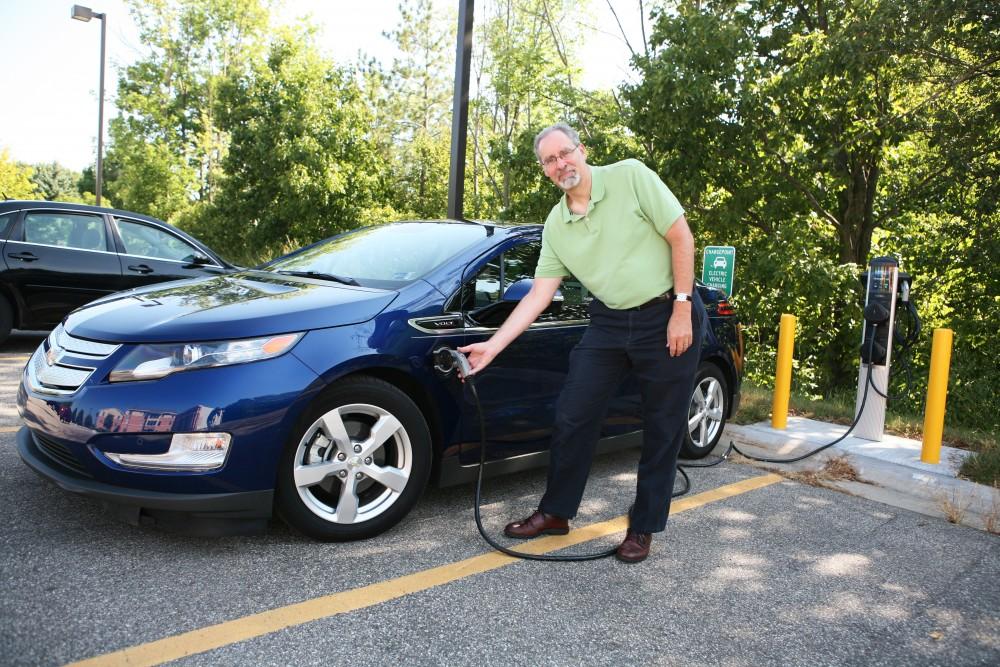Electric cars save cash for GVSU Honors College director

Jeff Chamberlain, director of the Frederick Meijer Honors College at Grand Valley State University charges his Chevy Volt at an electric charging station on the Allendale Campus.
Jul 24, 2012
In the throes of tough economic times, commuters who rely on cars all unite in the dreaded moment their tank needs a refill. According to AAA’s Daily Fuel Gauge Report, the average price per gallon in Michigan is around $3.57, ten cents more than the national average of $3.47.
However, for Grand Valley State University’s Director of the Frederick Meijer Honors College, Jeff Chamberlain, the pain at the pump feels a lot more painless thanks to his Chevy Volt – what he describes as his “beautiful looking, very sporty” car that gets 1,200 miles on just half a gallon of gas.
When Chamberlain decided it was time to purchase a new car, he had his eye on the Volt, a car that could give him an “extended range,” a car that wouldn’t let him down, stranding him in the middle of nowhere with no gas—or even worse, stranded in front of the gas station with prices that climb above the national average.
The United States Environmental Protection Agency (EPA) rated the Chevy Volt as the most fuel-efficient compact car in the country, getting 36 to 48 miles per gallon.
“I have been learning how to get the most miles I can,” Chamberlain said, still getting to know his first hybrid car that he purchased a month and a half ago. “The nice thing is that I can charge it at GVSU—free for the moment—so I hardly have to charge it for my commute work. If I charge it at home, I try to do it overnight, because the rates are cheaper—almost half of what they are during the day.”
GVSU has seven charging stations that can charge two cars at a time. Tere are three stations on the Allendale Campus, one outside of Niemeyer Honors College and two outside of the rec center. Four are on the Pew Campus and one is located at the Michigan Alternative and Renewable Energy Center, on the Muskegon Campus.
Currently, charging stations are free to use, and Bart Bartels, campus sustainability manager, said that he is unaware of any plans to change the usage fee.
“And the stations are almost always available too,” Chamberlain said.
There are many hybrid-car cynics, saying that the price of the new trendy electric car would be equivalent to paying for gas with a standard automobile. Chamberlain admitted that the Volt is not yet a “perfect solution to the emissions issue.”
“Union of Concerned Scientists just did a study that demonstrated that if an area relies on coal-powered plant for its electricity, then you are not reducing carbon emissions nearly as much as when your electricity comes from a cleaner source,” he said.
However, since Chamberlain has owned the Volt, he has never let the high gas prices get the best of him – in fact, he has yet to fill up his tank since the initial purchase, since the Volt still having the range of 300 miles on the gas that was in the car when he leased it. Chamberlain said averaged around $100 for gas per month with his old car. With the Volt, he only pays $10 to $12 worth of electric charges.
“Now, the Volt is an expensive car,” Chamberlain said, “but with the tax credit and the amount of money I save on gas, it’s very affordable. Another expense-saver is that I don’t have to take it in for oil changes very often—the gas engine will need oil changes, but only if I use it significantly.”
Although the Chevy Volt might not be “going green” in an earth-saving-way, it is “going green” financially for Chamberlain, and users will see a lot more green bills in their wallet.

























